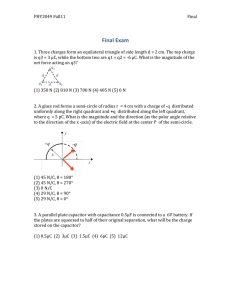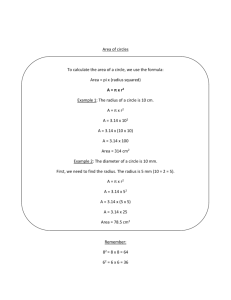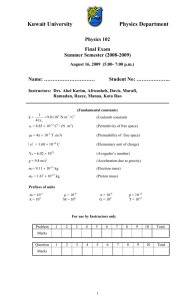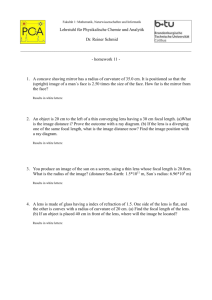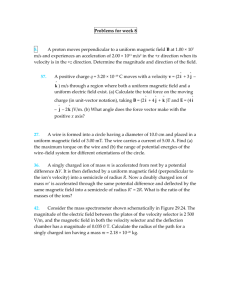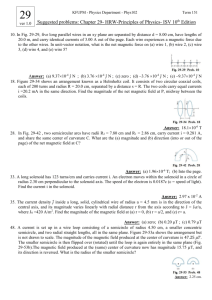77777 Instructor(s): PHYSICS DEPARTMENT PHY 2049, Fall 2011
advertisement
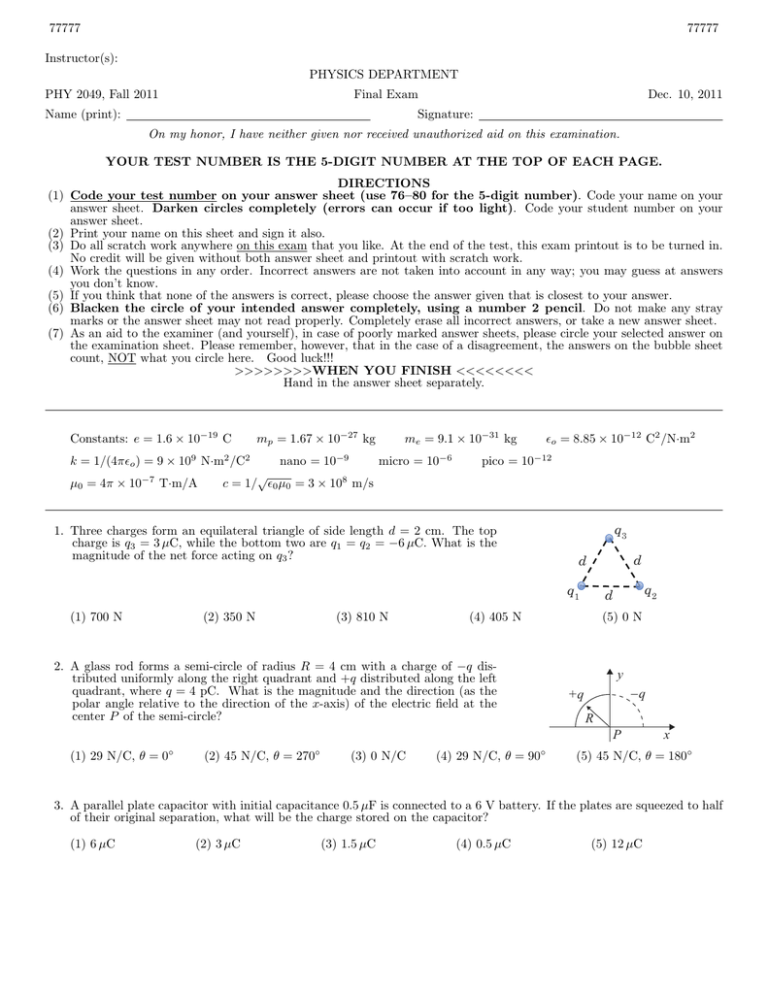
77777 77777 Instructor(s): PHYSICS DEPARTMENT PHY 2049, Fall 2011 Final Exam Name (print): Dec. 10, 2011 Signature: On my honor, I have neither given nor received unauthorized aid on this examination. YOUR TEST NUMBER IS THE 5-DIGIT NUMBER AT THE TOP OF EACH PAGE. DIRECTIONS (1) Code your test number on your answer sheet (use 76–80 for the 5-digit number). Code your name on your answer sheet. Darken circles completely (errors can occur if too light). Code your student number on your answer sheet. (2) Print your name on this sheet and sign it also. (3) Do all scratch work anywhere on this exam that you like. At the end of the test, this exam printout is to be turned in. No credit will be given without both answer sheet and printout with scratch work. (4) Work the questions in any order. Incorrect answers are not taken into account in any way; you may guess at answers you don’t know. (5) If you think that none of the answers is correct, please choose the answer given that is closest to your answer. (6) Blacken the circle of your intended answer completely, using a number 2 pencil. Do not make any stray marks or the answer sheet may not read properly. Completely erase all incorrect answers, or take a new answer sheet. (7) As an aid to the examiner (and yourself), in case of poorly marked answer sheets, please circle your selected answer on the examination sheet. Please remember, however, that in the case of a disagreement, the answers on the bubble sheet count, NOT what you circle here. Good luck!!! >>>>>>>>WHEN YOU FINISH <<<<<<<< Hand in the answer sheet separately. Constants: e = 1.6 × 10−19 C k = 1/(4π²o ) = 9 × 109 N·m2 /C2 µ0 = 4π × 10−7 T·m/A mp = 1.67 × 10−27 kg nano = 10−9 me = 9.1 × 10−31 kg micro = 10−6 ²o = 8.85 × 10−12 C2 /N·m2 pico = 10−12 √ c = 1/ ²0 µ0 = 3 × 108 m/s 1. Three charges form an equilateral triangle of side length d = 2 cm. The top charge is q3 = 3 µC, while the bottom two are q1 = q2 = −6 µC. What is the magnitude of the net force acting on q3 ? q3 d d q1 (1) 700 N (2) 350 N (3) 810 N q2 d (4) 405 N (5) 0 N 2. A glass rod forms a semi-circle of radius R = 4 cm with a charge of −q distributed uniformly along the right quadrant and +q distributed along the left quadrant, where q = 4 pC. What is the magnitude and the direction (as the polar angle relative to the direction of the x-axis) of the electric field at the center P of the semi-circle? y −q +q R P (1) 29 N/C, θ = 0 ◦ (2) 45 N/C, θ = 270 ◦ (3) 0 N/C (4) 29 N/C, θ = 90 ◦ x (5) 45 N/C, θ = 180◦ 3. A parallel plate capacitor with initial capacitance 0.5 µF is connected to a 6 V battery. If the plates are squeezed to half of their original separation, what will be the charge stored on the capacitor? (1) 6 µC (2) 3 µC (3) 1.5 µC (4) 0.5 µC (5) 12 µC 77777 77777 4. A beam of electrons (“cathode rays”) is sent between two parallel electric plates ~ = −2×104 ĵ N/C. If the electron beam with an electric field between them of E travels perpendicular to the electric field with a velocity of ~v = 4.2 × 107 î m/s, what magnetic field is necessary (direction and magnitude) so that the electrons continue traveling in a straight line without deflection by the electric field? y + + + + + + + e- E x − − − − − − (1) −4.8 × 10−4 k̂ T (2) 4.8 × 10−4 k̂ T (3) 2.0 × 104 ĵ T (4) −2.0 × 104 ĵ T (5) 2.1 × 103 î T 5. Part of a long insulated wire carrying current i = 4 A is bent into a circular section of radius R = 1.5 cm as shown in the figure. What is the magnitude of the magnetic field (in T) at the center of curvature C if the circular section lies in the plane of the page as shown? (1) 2.2 × 10−4 (2) 5.3 × 10−5 (3) 1.7 × 10−4 (4) 1.1 × 10−4 (5) 5.0 × 10−6 6. A series RLC circuit is driven by a sinusoidally-varying EMF source. The current lags the EMF by 30◦ . What can be concluded about the driving frequency ω? √ √ √ (1) ω > 1/ LC (2) ω < 1/ LC (3) ω = 1/ LC (4) ω = 0 (5) ω = ∞ 7. A constant current of i = 3 A is used to charge a parallel plate capacitor with circular plates of radius R = 1 cm. What is the magnitude of the magnetic field at a radius of r = 0.3 cm, which is less than R, in the region between the plates? (1) 1.8 × 10−5 T (2) 6 × 10−5 T (3) 1.2 × 10−4 T (4) 3.8 × 10−6 T 8. Light traveling horizontally enters a right prism as shown in the figure. The index of refraction of the prism is n = 1.6, and it is surrounded by air. What is the measure of the angle θ2 that the light deflects from horizontal when it exits the prism? (5) 0 T 45° θ1 θ2 (1) 31◦ (2) 26◦ (3) 19◦ (4) 45◦ (5) 0◦ 9. An object is placed 40 cm in front of a converging lens with a focal length of 60 cm. Where is the image? (1) (2) (3) (4) (5) 120 cm in front of the lens 60 cm behind the lens 120 cm behind the lens 17 cm behind the lens 40 cm in front of the lens 10. A thin anti-reflective coating with an index of refraction of n1 = 1.4 is placed on a lens with an index of refraction of n2 = 1.5. What is the minimum coating thickness in nm needed to ensure that light of wavelength 490 nm in air and of perpendicular incidence will be reflected from the two surfaces of the coating with fully destructive interference? Assume that the lens+coating is in air. (1) 88 (2) 122 (3) 490 (4) 175 (5) 245 77777 77777 11. A point particle with charge q is at the center of a Gaussian surface in the form of a cube. The electric flux through any one face of the cube is: (1) q/6²0 (2) q/4π²0 (3) q/4²0 (4) q/²0 (5) q/16²0 12. A total charge of 7 × 10−8 C is uniformly distributed throughout a non-conducting sphere with a radius of 5 cm. The electric potential at the surface, relative to the potential far away, is about: (1) 1.3 × 104 V (2) −1.3 × 104 V (3) 7.0 × 105 V (4) −6.3 × 104 V (5) 0 13. Five cylindrical wires are made of the same material. Their lengths and radii are wire 1: length `, radius r wire 2: length 3`/2, radius r/2 wire 3: length `/2, radius r/2 wire 4: length `, radius r/2 wire 5: length 5`, radius r/2 Rank the wires according to their resistances, least to greatest. (1) 1, 3, 4, 2, 5 (2) 5, 4, 3, 2, 1 (3) 1 and 2 tie, then 5, 3, 4 (4) 1, 3, 5, 2, 4 (5) 1, 2, 4, 3, 5 14. The current in the 5.0-Ω resistor in the circuit shown is: (1) (2) (3) (4) (5) 6.0 Ω 4.0 Ω 12 V 1.5 A 0.67 A 0.42 A 2.4 A 3.0 A 12 Ω 15. A rod with resistance R lies across frictionless conducting rails in a constant uniform magnetic field B, as shown. Assume the rails have negligible resistance. The magnitude of the force that must be applied by a person to pull the rod to the right at constant speed v is: (1) (2) (3) (4) (5) 5.0 Ω 3.0 Ω x v X X B 2 L2 v/R BLv BLv/R 0 B 2 Lxv/R L X X X X X X X X 16. A parallel plate capacitor has circular plates with a radius R = 3 cm and a time-dependent uniform electric field between them of (1.5 × 106 V/m-s) t. What is the magnitude of the induced magnetic field at a radius of r = 4 cm from the central axis connecting the centers of the plates, which is larger than the radius R covered by electric field? (1) 1.9 × 10−13 T (2) 1.4 × 10−13 T (3) 2.5 × 10−13 T (4) 6.6 × 10−11 T (5) 0 T 17. A sinusoidal electromagnetic wave with an electric field amplitude of 100 V/m is incident normally on a surface with an area of 1 cm2 and is completely absorbed. The energy absorbed in 10 s is: (1) 13 mJ (2) 1.3 mJ (3) 27 mJ (4) 130 mJ 18. The figure shows a concave mirror with a small object located at the point marked 6. If the image is also at this point, then the center of curvature of the mirror is at the point marked: (1) 6 (2) 4 (3) 3 (4) 9 (5) 270 mJ 2 4 6 (5) 12 8 10 12 77777 77777 19. The diagram shows a single slit with the direction to a point P on a distant screen shown. At P, the pattern has its second minimum (from its central maximum). If X and Y are the edges of the slit, what is the path length difference (PX)−(PY)? (1) 2λ (2) λ (3) 3λ/2 (4) λ/2 Y incident light to P X (5) 5λ/2 20. Monochromatic light is normally incident on a diffraction grating that is 1 cm wide and has 10,000 slits. The first order line is deviated at a 30◦ angle. What is the wavelength, in nm, of the incident light? (1) 500 (2) 400 (3) 300 (4) 600 (5) 1000
